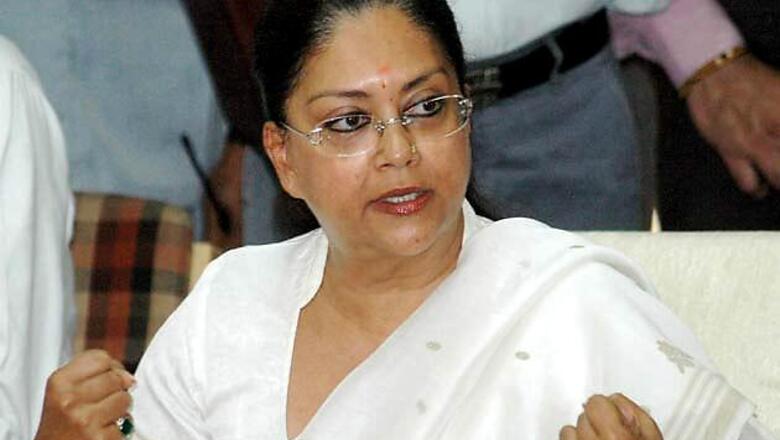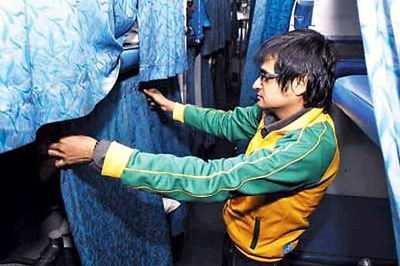
views
Jaipur: Vasundhara Raje, who failed five years ago on account of infighting in BJP, reinvented herself and galvanised the cadre to spearhead her party's spectacular comeback to power in Rajasthan.
60-year-old Raje, who belongs to the royal Scindia family of Gwalior and married in Rajasthan, had even once threatened to quit the party. But then she managed to get the BJP high command fully behind her in her bid to oust the Congress government headed by Ashok Gehlot.
The icing on the cake for her was the full-throated backing from Narendra Modi who extensively toured Rajasthan during the election campaign.
Her rise from a National Executive member of BJP to one of its most powerful leaders in Rajasthan can be attributed to her charismatic personality and strong will, which have helped her tide over political crisis from within and outside in her 30-year-long political career.
While she is adored by her supporters for her plain spoken and outgoing manners, her detractors believe her inaccessibility and like-it-or-lump-it attitude was the reason behind BJP's debacle in 2008 Assembly polls and the subsequent Lok Sabha elections.
Member of a Maratha royal family who married into a Jat family, she enjoys a connect with masses cutting across castes and communities that lends her the X-factor in a heterogeneous state like Rajasthan where acceptability of most politicians wilts outside a particular region or group.
Daughter of founding BJP leader Vijayraje Scindia and sister of deceased Congress leader Madhavrao Scindia, she has been elected to the state Assembly thrice and five times to Lok Sabha.
After being appointed as BJP's National Executive member in 1984, she became vice-president of Yuva Morcha in Rajasthan a year later and was elected to state assembly the same year. Since then Raje's rise has been steady which culminated in her becoming the state's first woman chief minister in 2003 when the "angrezi-speaking maharani", a phrase used by her critics to refer to her elitist and royal background, led BJP to its most famous victory in the predominantly rural state.
The saffron party had bagged a majority for the first time -- it won in 120 out of 200 seats -- a feat which had eluded even its stalwart and former CM Bhairon Singh Sekhawat. If she was seen as an efficient administrator with a grip on bureaucracy, she was also accused of having authoritarian tendencies which antagonised powerful satraps and numerically significant groups like Gujjars and Meenas, resulting in BJP losing a tight electoral race in 2008 to Congress.
Raje became the leader of Opposition but had to quit in February, 2010, on the party's directions after BJP suffered a drubbing in Lok Sabha polls, winning only four of 25 seats. It was the time when RSS was asserting itself in the party's affairs and Raje was never a favourite of the Hindutva organisation.
Unlike her mother, who passionately advocated political Hinduism, Raje kept RSS and its affiliates at an arm's length from government's affairs.
Marginalised by her party, she kept a low profile for some time before she rallied her supporters to bounce back last year.
First, she cut RSS-favourite Gulab Chand Kataria, a seasoned party leader and chief ministerial aspirant, to size by forcing the party to cancel his planed 28-day yatra across the state last year.
The yatra, he believed, would have propelled him as the BJP's face in the state at a time the Ashok Gehlot government was seemingly in a drift.
A majority of party's MLAs sided with her, knowing well that she and not Kataria had the charisma of bringing the party back to power. A reluctant BJP national leadership had little choice but to bow to her wishes and let her helm the party's affairs.
Raje was appointed state party president and launched Suraj Sankalp Yatra in April, which drew a good response from people, lifting the morale of party workers. She was later named party's chief ministerial candidate.
She also vociferously supported Narendra Modi's prime ministerial candidature within the party and as the Gujarat Chief Minister's graph rose so did hers, neutralising any potential obstacle she might have had to face.
A graduate with economics and political science degrees from Mumbai University, Raje'e energetic campaign has been one of the hallmarks of the electioneering. At a personal level, she is more of the quintessential modern woman leader who is as much at ease in the traditional tribal dress hearing out the concerns of village population as she enjoyed walking the ramp or interacting with celebrities in royal parties.
And her supporters love their 'maharani' for this.
(With inputs from PTI)

















Comments
0 comment